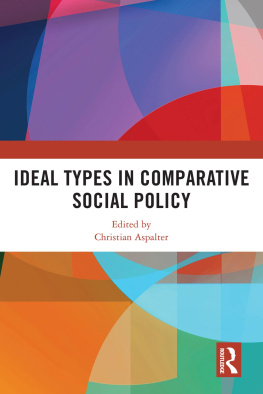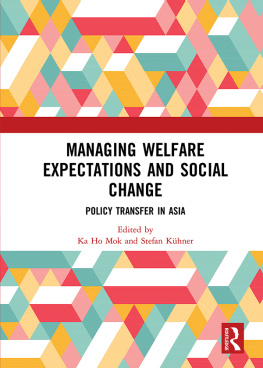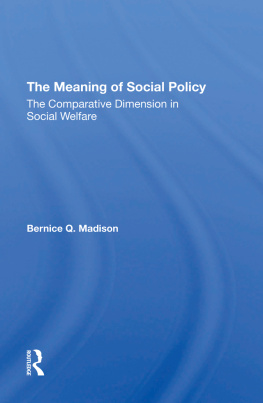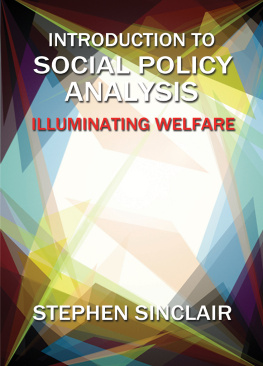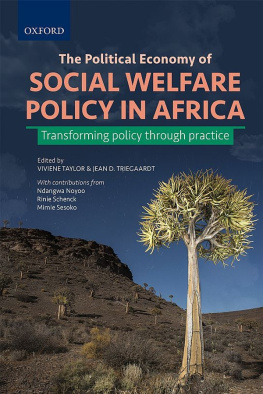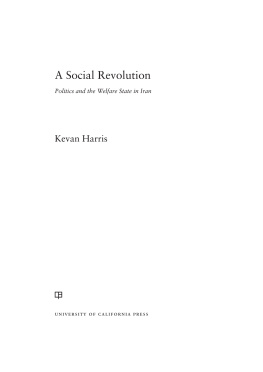Ideal Types in Comparative Social Policy
This book introduces readers to the world of ideal types within the readings of Max Weber by giving a theoretical understanding of ideal types, as well as applying the development of ideal types to an array of social policy arenas.
The 21st century has seen the development of welfare regime analysis marked by two differing strands: real-typical welfare regime analyses and ideal-typical welfare regime analyses; the latter focusing on the formation, development, and application of ideal types in general comparative social policy. Designed to provide new theoretical and practical frameworks, as well as updated in-depth developments of ideal-typical welfare regime theory, this book shows how Webers method of setting up and checking against ideal types can be used in a wide variety of policy areas, such as welfare state system comparison, comparative social and economic development, health policy, mental health policy, health care system analysis, gender policy, employment policy, education policy, and so forth.
The book will be of interest to all scholars and students working in the fields of social policy, including health policy, public policy, political economy, sociology, social work, gender studies, social anthropology, and many more.
Christian Aspalter is Professor of Social Policy, Former Founding Head, Social Work and Social Administration Program, Beijing Normal University-Hong Kong Baptist University United International College, Zhuhai, China. His most recent publications include The Routledge International Handbook to Welfare State Systems (editor, Routledge, 2017).
Congratulations to Christian Aspalter and his colleagues for producing an interesting and incisive overview of welfare typologies and their role in international social policy. Also known as ideal types or welfare regimes, they facilitate the analysis of social policies around the world. The editor and contributors assess their contribution by tracing their historical evolution, explaining their empirical and theoretical dimensions, reviewing their normative relevance and discussing their role in specialized fields like employment policy, health and long-term care. The book makes a sophisticated contribution to the literature and should be widely consulted by anyone interested in international and comparative welfare today.
James Midgley , Dean Emeritus and Professor of the Graduate School, University of California Berkeley, USA
Ideal-types have been one of the basic tools of comparative social policy for many years. We use ideal-types because they allow us to reduce the complexity of the social world we want to study. But is this reduction of complexity always justified, when and when not? Are ideal-types sometimes mistaken with reality, and what are they, and how are they being used? This book provides some highly sophisticated and much needed thinking on how we use ideal-types to make sense of welfare state differences. An essential reading for everyone involved in comparative social policy research.
Giuliano Bonoli , Professor of Social Policy, University of Lausanne, Switzerland
Ideal Types in Comparative Social Policy
Edited by
Christian Aspalter
First published 2021
by Routledge
2 Park Square, Milton Park, Abingdon, Oxon OX14 4RN
and by Routledge
52 Vanderbilt Avenue, New York, NY 10017
Routledge is an imprint of the Taylor & Francis Group, an informa business
2021 selection and editorial matter, Christian Aspalter; individual chapters, the contributors
The right of Christian Aspalter to be identified as the author of the editorial material, and of the authors for their individual chapters, has been asserted in accordance with sections 77 and 78 of the Copyright, Designs and Patents Act 1988.
All rights reserved. No part of this book may be reprinted or reproduced or utilised in any form or by any electronic, mechanical, or other means, now known or hereafter invented, including photocopying and recording, or in any information storage or retrieval system, without permission in writing from the publishers.
Trademark notice : Product or corporate names may be trademarks or registered trademarks, and are used only for identification and explanation without intent to infringe.
British Library Cataloguing-in-Publication Data
A catalogue record for this book is available from the British Library
Library of Congress Cataloging-in-Publication Data
A catalog record has been requested for this book
ISBN: 978-0-367-27976-9 (hbk)
ISBN: 978-0-429-31903-7 (ebk)
Typeset in Times New Roman
by Deanta Global Publishing Services, Chennai, India
Contents
PART I
Introduction
Christian Aspalter
PART II
Comparative theory and background
Varvara Lalioti
Martin Seeleib-Kaiser and Jakub Sowula
Christian Aspalter
Christian Aspalter
PART III
Applying ideal types in comparative theory and methodology
Christian Aspalter
Claus Wendt and Clare Bambra
Kai Leichsenring
Deborah Rice
Patricia Frericks, Julia Hppner, and Ralf Och
PART IV
Concluding Part
Christian Aspalter
| Toward a definition of integrated long-term care |
| The mixed economy of long-term care |
| An ideal-typical classification of employer services |
| Different N-dimensional theoretical spaces |
| Ideal-typical space of characteristics of the application example: Social rights as fully individualized versus fully family-based (differentiated by family dimensions: partner, children and other family members) |
| Empirical data in an ideal-typical space: Family-based pension rights in the space of characteristics |
| A Selection of Real-Typical Welfare Regime Analyses and Their Classifications |
| A Selection of Ideal-Typical Welfare Regime Analyses and Their Classifications |
| Ideal-Typical and Real-Typical Methodology Compared |
| The Ten Ideal-Typical Worlds of Welfare Regimes |
| Health Care Systems: Dimensions, Typologies and Countries |
| A Typology of European Long-Term Care Regimes |
| Toward Ideal-Typical LTC Regimes From a Global Perspective |
| Degree of Family-Related Pension Rights at Target Social Security Level (TSSL) in 2013 |
| Positive Versus Normative Social Policy Theory |
| Normative principles of social policy ethics: A post-COVID-19, post-artificial intelligence/post-hyper-digitalization version, in the light of aging of society |
Christian Aspalter is Professor of Social Policy, Former Founding Head, Social Work and Social Administration Program, Beijing Normal University-Hong Kong Baptist University United International College, Zhuhai, China. His most recent publications include The Routledge International Handbook to Welfare State Systems (editor, Routledge , 2017).
Clare Bambra is Professor of Public Health, Institute of Health and Society, University of Newcastle, UK.
Patricia Frericks is Professor of Social Policy, University of Helsinki, Finland.
Julia Hppner is Professor and Chair of Sociology and Economy of the Welfare State, University of Kassel, Germany.

